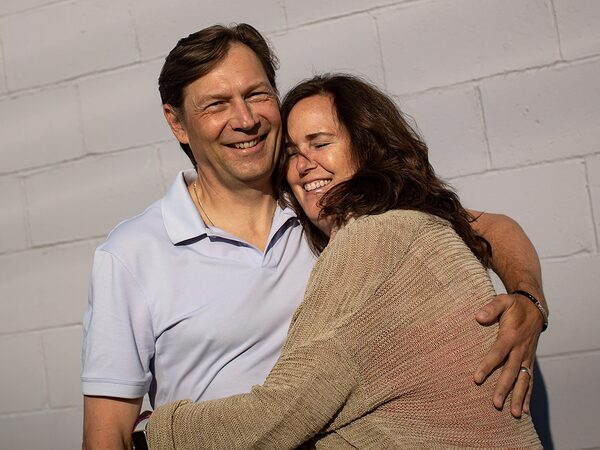
Neil Rachynski and his wife Julie speak openly and honestly about their goals and expectations for the future.Darryl Dyck
Neil Rachynski wears a wooden bracelet. “It’s so I can knock on wood whenever I talk about how lucky I’ve been,” says the 54-year-old resident of Kamloops, B.C.
He considers himself fortunate to have survived acute myeloid leukemia (AML), and to be in remission two years after diagnosis. AML is a rapidly-progressing cancer of the bone marrow and blood. According to the Leukemia and Lymphoma Society of Canada (LLSC), one quarter of the approximately 22,500 people living with leukemia in Canada have AML.
Rachynski’s experience with blood cancer changed how he, his wife Julie and their two children speak to each other about cancer, life and everything. They communicate more openly than they ever did before. They don’t overanalyze their luck, or dwell on the randomness of who survives cancer and who does not. They speak plainly about what the future may or may not hold, and express their love for each other on a regular basis.
“You don’t have time to dance around subjects anymore,” Rachynski says.
In the months before he was diagnosed with AML, his family made a big move. In Fall 2017, Julie accepted an exciting job opportunity based in Toronto, so in Spring 2018 the family sold their home in Kamloops and joined Julie in Toronto, renting a condo downtown. Rachynski quit his job in digital marketing and communications, expecting to find a new gig in the fall. While the couple’s 20-year-old son Zachery stayed out west, their 17-year-old daughter Jordan graduated high school and moved to Toronto with her parents.
Then in September, Rachynski got what seemed to be a flu that never went away. When he got so dizzy he could barely stand, Julie took him to the nearby emergency department, where he collapsed in the waiting room.
Hours later, doctors told him he had leukemia. “It’s like life says, ‘Pencils down,’” Rachynski says.
Conversations with their children got real very quickly. Zachery and Jordan’s close childhood friend had died of leukemia three years before at the age of 17, so the kids knew all too well what the disease could do to someone they cared about.
“They had seen it. I had to face the fact with them that it may not be all right. Those were hard conversations,” Rachynski says. He was honest with them about his chances of survival, but also reassured them. “You’ll be all right,” he told them.
Rachynski’s commitment to honest talk was partly influenced by his father. When his dad was facing bypass surgery a few years before, the two had a heart-felt conversation.
“He had told me years earlier that the price of your life is your death. Live in a way so that when you go, you can say it was worth the price,” Rachynski says, noting that revisiting the old advice brought the two of them closer.
Nadine Prevost, director, community services at The Leukemia & Lymphoma Society of Canada, says their research shows that telling loved ones about a cancer diagnosis can be one of the most difficult aspects of having cancer. “Every 23 minutes, someone is diagnosed with a blood cancer in Canada,” she notes.
That’s why The Leukemia & Lymphoma Society of Canada has created resources to help with those conversations. For example, the First Connection program connects newly-diagnosed people and their families with a trained, volunteer survivor, providing one-on-one support and helping them connect with their peers to feel understood and less isolated. Program organizers consider age, gender, diagnosis and treatment to ensure an optimal match.
“Every blood cancer experience is unique but a chance to speak with someone who has lived through a blood cancer diagnosis and share similar experiences can be validating and provide hope,” says Prevost.
Rachynski did six weeks of chemotherapy at Toronto’s Princess Margaret Hospital. Julie would visit every evening – fully masked and gowned – and they would talk about what the latest test results meant, what was ahead, and how they would cope if he were to die. At that point, they didn’t know how the disease was progressing. Three more months of outpatient chemotherapy and tests followed.
To cope with the uncertainty, the couple learned to temper their talk.
“We’ll talk about the scary, but we don’t linger,” Rachynski says.
In Feb. 2019, blood tests showed that Rachynski’s cancer was in remission. By then, the family was back in B.C. and Julie had resumed her former job in Kamloops – they all wanted to be home again.
Since then, life for the family has been about savouring every minute. They travel when possible, Rachynski started a new job, and the couple resumed trail running. They spend time together as much as they can, speaking openly and honestly about their goals and expectations for the future.
Being real with each other means they can support each other, Rachynski says.
“I’m a pretty strong, positive, stoic person,” he says. “But you can’t do something like this on your own.”
The Leukemia & Lymphoma Society of Canada offers support to people diagnosed with blood cancer through their First Connection peer-to-peer program (llscanada.org/support/peer-support-program), as well as a Caregiver Support program for those caring for people with blood cancer (llscanada.org/support/caregiver-support)
Advertising feature produced by Globe Content Studio. The Globe’s editorial department was not involved.